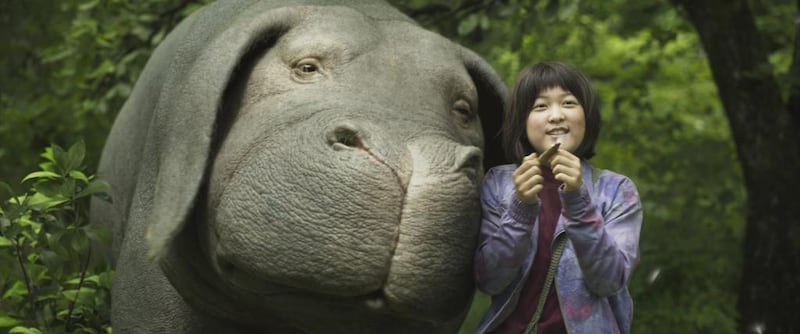Director: Bong Joon-ho
Stars: Tilda Swinton, Jake Gyllenhaal, Ahn Seo-hyun
Three stars
How do we feed a planet with a rapidly rising population of seven billion?
This is a question that scientists, ecologists, philosophers and politicians have been grappling with for years – but for the Mirando Corporation (no prizes for subtlety when it comes to which similar-sounding, much-maligned agrochemical business might be the inspiration here) the answer is simple: create a new species of giant, genetically modified “super-pigs” that grow to a huge size and providing maximum food while eating less than regular animals and with a lesser environmental impact.
The company’s chief executive Lucy Mirando (Tilda Swinton) takes 26 of the best specimens and sends them to farms around the globe to discover which environments they can live and grow most successfully in.
Thus we meet Mija (Ahn Seo-hyun), a young Korean girl who has been raising Okja, one of the specimens, on her grandfather’s mountaintop farm for almost 10 years.
Okja is both her pet and her best friend, their idyllic days are spent frolicking and getting into various scrapes atop the mountain. But with the 10-year trial ending, it is time for Okja to return to New York for judgement day.
Enter celebrity TV zoologist Dr Johnny Wilcox (Jake Gyllenhaal), the “Face of Mirando”, to tear Okja away from her mountain home – and cue the start of Mija’s quest to rescue her four-legged friend, aided by a group of pleasingly comical animal-rights activists, led by Jay (Paul Dano).
This Netflix original movie is essentially a "loveable hero sets out to rescue kidnapped pet" story in the vein of 101 Dalmations or ET, but director Bong Joon-ho (The Host, Snowpiercer) deftly juxtaposes this with a damning indictment of modern society's attitude to consumption.
He does not go overboard with the moralising but plants enough of a (non-genetically modified) seed to force you to question the ethics of mass food production and genetic engineering. Bong has clearly decided the key to approaching a complex, difficult subject in an accessible way is through comedy, and the performances reflect this.
Swinton’s Lucy is a bumbling parody of the well-meaning, but ultimately doomed, face of environmentally friendly capitalism. Her sister, Nancy (also played by Swinton), is a pantomime caricature of capitalism with no such fluffy pretensions.
Dr Johnny is the sort of pathetic, washed-up B-lister you expect to find selling his soul to the Celebrity Big Brother house (or an agrochemical corporation) in the hope of one last grasp at fame, and Jay and his crew are basically a comedy troupe with balaclavas - one member, Silver (Devon Bostick), is so dedicated to the environmental cause that he’s constantly on the verge of fainting from hunger because he won’t even eat fruit in case it has been tainted by chemicals.
The film attracted attention during its premiere in Cannes in May for all the wrong reasons when an already hostile audience of cinema purists, averse to a Netflix production being allowed into the hallowed fold, were angered by the film being projected in the wrong aspect ratio.
Now that it is finally available on Netflix, it should be able to attract plenty of attention again, and this time for the right reasons – as a thought-provoking and thoroughly entertaining movie.
cnewbould@thenational.ae





